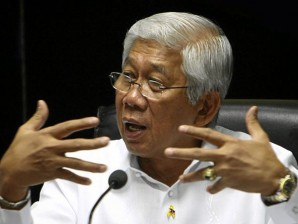Gazmin calls for formal protest of Chinese naval patrol of disputed territories

Defense Secretary Voltaire Gazmin. INQUIRER FILE PHOTO
MANILA, Philippines—Defense Secretary Voltaire Gazmin said Friday the Philippines should formally protest China’s reported new policy on patrolling the South China Sea as security experts viewed as a serious concern China’s threat to board and expel vessels that enter areas it claims to be part of its territory.
“That’s not a good statement from China. We will just have to see what we can do to avoid this situation where they will be boarding our ships. Maybe at this point we need to file right away a protest. Let’s do the diplomatic and legal action on this,” Gazmin told reporters following the rites commemorating the 149th birth anniversary of Andres Bonifacio at the Philippine Army’s headquarters at Fort Bonifacio.
Defense spokesperson Peter Paul Galvez said Gazmin’s recommendation would be “the action once (the new border patrol rule) is made official” by a statement from the Chinese government itself.
On Thursday, China’s state-run media reported that China will allow its police in the southern Chinese province of Hainan to board, seize control, or expel foreign ships that “illegally enter” Chinese waters.
The reports said the new rule would take effect on Jan. 1.
Article continues after this advertisementAs of late Friday afternoon, Galvez said the Department of National Defense continued to “gather more information” regarding China’s reported new border patrol rule.
Article continues after this advertisement“We are waiting for an official statement from the Chinese government. That will be something that the Department of Foreign Affairs (DFA) will clarify,” Galvez said.
For security experts, however, China’s aggressive moves to assert its sovereignty over disputed territories are taking shape as a national security concern for the Philippines but it would not spell war between the two countries.
Before China’s state-run media reported the new border patrol rule, China issued new passports bearing a map of China that includes disputed islands in the South China Sea as part of its territory.
“It will create a national security problem because China is already adamant in pursuing its interests,” Prof. Chester Cabalza of the National Defense College of the Philippines told the Inquirer by phone, when asked about the national security implications on the Philippines of China’s new border patrol rule.
In a separate interview, Dr. Gloria Jumamil-Mercado, a former senior adviser to the National Security Adviser, said she shared Cabalza’s view that China’s new border patrol rule was a national security issue.
Mercado, currently the dean of the graduate school of the Development Academy of the Philippines, is a trustee of several non-government organizations focusing on development and security.
“In the context of the definition of national security, it is about the security of the state and human security. We are talking about territorial integrity of the state and its impact on the welfare of the people,” Mercado told the Inquirer by phone.
But both Mercado and Cabalza, who have studied China extensively, said China would not go to war with the Philippines.
“I don’t believe China will go to war for the West Philippine Sea. China would not do something to risk their economic gains,” said Mercado, who has a doctorate degree in Mainland China Studies.
Instead, Cabalza said, what is developing is a battle of strategies, with China making sure that it leaves the other claimants “in awe” of what it does.
“It greatly impacts on us because the Philippines’ strategy is to use international legal instruments. It’s all we can do. We cannot contain China’s maritime strength,” said Cabalza, a fellow in China’s National Defense University.
To put things in context, Mercado said the latest developments in the West Philippine Sea should also be viewed from how China has dealt with its Cross-Straits relations with Taiwan.
When Taiwain’s democratic movement was gaining ground, China issued white papers, petitions, and even conducted a test-missile exercise in the Taiwan Strait, she said.
It has always been China’s strategy to flex its muscles even when dealing with Taiwan, Mercado said.
Defense spokesperson Galvez said he “cannot define” the situation as a national security concern just yet.
“I might be reacting too much. This (border patrol rule) might be a speculation by a Chinese official. We haven’t heard from Chinese government itself,” Galvez said.
Nonetheless, Galvez said the Philippine government would continue to “enforce our maritime policies in our own UNCLOS (UN Convention on the Law of the Sea) defined territory.”
“Any country has a right to protect their own territorial waters and the DND continues to do the same together with the Philippine Coast Guard,” Galvez said.
Galvez also appealed to the claimant-countries in the disputed territories to be more circumspect in issuing statements “as responsible members of the international community and should avoid aggravating the situation.”